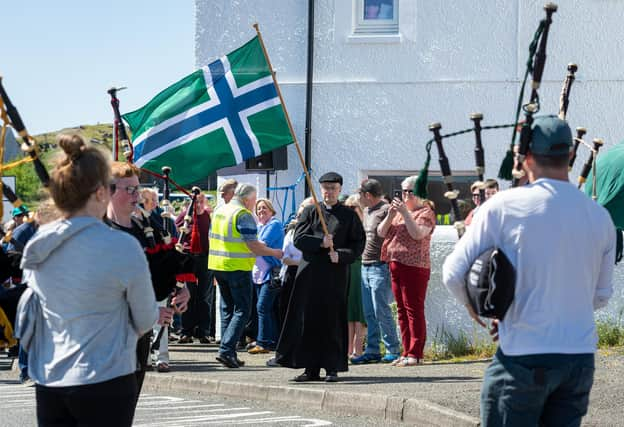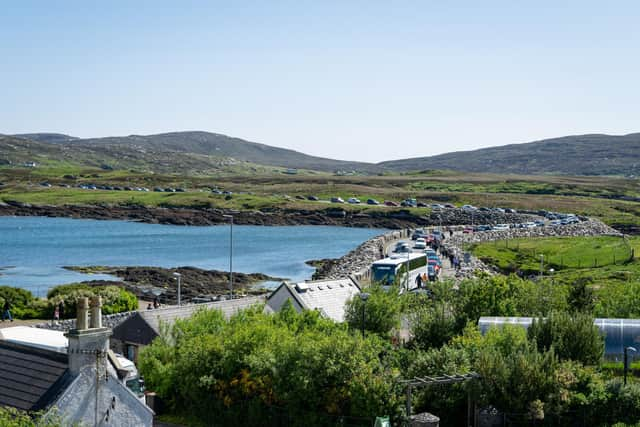It’s time for CalMac to find an island home


Then an e-mail came through, in the nick of time to prevent severe editorial embarrassment but otherwise devastating in its implications, particularly for South Uist. Yet again, the MV Lord of the Isles was to be withdrawn from the Mallaig-Lochboisdale route, only six days after returning to it.
I checked the CalMac web-site. It was showing “normal service” on the route and bookings were still being taken. Yet by then, through some private process in Gourock, with Ministerial knowledge and approval in Edinburgh but without any local consultation whatsoever, a decision had been taken.
Advertisement
Advertisement
This time, the withdrawal of service was to be for the full month of June – an astonishing body blow to an island economy which has already suffered more than most. Once again, the cancellations rolled in as CalMac texted out to tell thousands of would-be travellers that their bookings were cancelled.


In some respects, it was a familiar scenario. This time, however, the circumstances were so extreme that it sparked a mass reaction which expressed itself through Sunday’s unprecedented demonstration at Lochboisdale. It also epitomised much of what is wrong about the way Caledonian MacBrayne is run and the political context within which it operates.
There was a particular sense of betrayal because the arbitrary action by the company’s management directly contradicted an explicit assurance given by a Scottish Government Minister just nine days earlier. The otherwise pointless visit to Uist of Kevin Stewart, the latest Transport Minister, had seemed useful for only one reason.
By all accounts of those present, having listened to descriptions of how South Uist has experienced particular hardship through a litany of ferry woes, backed up by facts and figures, Mr Stewart volunteered an assurance that in the event of further disruption, he would personally ensure that the Lochboisdale link was safeguarded.
Advertisement
Advertisement
John Daniel Peteranna, a founder of the Uist Business Action Group, says: “He gave us an assurance – this won’t happen again, not on my watch. Then nine days later, the same thing happened again”. CalMac’s confirmation that Mr Stewart was informed in advance of an announcement, without any intervention from him, only added insult to serious injury.


The Action Group was formed just over a year ago, in very similar circumstances when the Lord of the Isles was withdrawn “at a moment’s notice”. John Daniel’s accommodation business took an immediate hit of over £4000 in cancelled bookings. The CalMac texts, he points out, simply tell people their ferry booking is cancelled, without mention of alternative routes. So the first thing they do is cancel their accommodation.
Since then, the Action Group has met everyone who should have been able to make a difference from the former Deputy First Minister, John Swinney, downwards through two Transport Ministers, the hierarchy of Transport Scotland to the senior management of CalMac itself. “We show them the facts and figures. We show them our alternatives to cancellation. They all nod in agreement. Then nothing happens. The next time there is a wobble somewhere in the system, we lose our ferry again”.
“All we want”, says John Daniel, “is parity. We understand that there has been chronic under-investment and there are not enough ferries until the ones being built in Turkey appear. In the meantime, when there is pain to be had, it is only fair that all the islands should share in it equally”.
Advertisement
Advertisement
BEYOND THE immediate fury about the treatment of a particular route, lie more fundamental questions. Over the decades, whenever CalMac was threatened with privatisation or break-up, I have defended it and would still do so in principle. But that certainly does not mean change is not required.
In current circumstances, there is no doubt that primary responsibility lies elsewhere. A ferry operator cannot run its business efficiently without enough ferries – which is exactly the position CalMac has been left in by the Scottish Government, Transport Scotland and the quango that is supposed to provide the vessels, CMAL.
No amount of blame-shifting can conceal that fundamental truth. Whatever the failings of CalMac management, they have been left in the impossible position of not having enough ferries to maintain their network. That is the door at which political responsibility must rest, without deflection.
Loyalty to CalMac also extends to its workforce. It is shameful that so much of the flak for failings that are entirely beyond their control has to be borne by those who work for the company, do their level best to maintain a service and who interface with the public, while the distant figures who bear guilt are never to be seen. Anyone heard form Erik Østergaard lately?
Advertisement
Advertisement
The current CalMac contract runs out next year and the Scottish Government, which loves paying consultants to do its thinking, has just shelled out £5 million for advice on how the next one should be organised. Presumably, they will also go through the motions of competition though the options have already been narrowed.
Ernst and Young were hired under Project Neptune to look at how other countries run their ferry services. It was a pointless exercise. Nicola Sturgeon promptly ruled out most of the options. The one that remains is to continue with a single, state-owned company, probably through the re-merger of CMAL and CalMac.
Even if that is right in principle, it certainly does not mean endorsing the way things are run at present – and this is where the islands must make their voice heard as never before. As John Daniel Peteranna says: “Nobody on the west coast has faith in CalMac as it is currently run. The management needs to change. They have to relocate to one of the islands they exist to serve. That would force them to listen and be accountable”.
These should be core demands for a very different kind of CalMac in the future. If there is no confidence in how CalMac is run, there is even less in CMAL. Therefore any “solution” which involves the companies being brought together with CMAL’s leadership replacing CalMac’s and life going on as before would be an equally unacceptable shuffling of the deck-chairs.
Advertisement
Advertisement
If it is left to unengaged Scottish Government ministers, self-interested Transport Scotland civil servants and the quangos themselves, that is what will happen. There will be no fundamental change. In a couple of years time, the Turkish ferries will arrive and the immediate crisis will be resolved. But the fundamentals will stay the same – remote control and an opportunity missed.
THE LOCHBOISDALE demonstration should signal a new assertiveness and the islands served by CalMac should come together to set their own agenda for a ferry company that is run from the islands, for the islands and staffed as far as possible by people who live on islands. It is an economic and social argument as well as underpinning the efficient, accountable running of a vital transport system, by people who themselves depend on it.
Nobody in their right mind would come up with what exists at present. The fact that CalMac is run from Gourock is the product of an historical accident – the merger in 1973 of two state-owned entities, David MacBrayne Ltd and the Caledonian Steam Packet Company which served Clyde routes. It might have made sense at the time but makes none at all now.
Even the car ferry services which ran out of Gourock no longer exist – only a huge office and top-heavy management superstructure which grows and grows. There is a widespread view that the efficiency of the company has declined in inverse proportion to the number of well-paid executives employed by CalMac. How many senior jobs could instead be located in the islands?
Advertisement
Advertisement
The separation of infrastructure from operations has been a disaster, epitomised by the Ferguson debacle but also reflected in a range of other projects that went wrong or were pursued with complete disregard to local opinion. Re-uniting the two organisations without fundamental change to the way they operate entirely misses the point.
I have written often about the boards of CalMac and CMAL which, throughout the decade of developing chaos, were devoid of a single resident of any island which these companies supposedly exist to serve. This is not some abstract point about democracy or accountability. It goes to the core of the relationships between governors and governed which now needs to be challenged.
Islanders have been kept away from these organisations precisely because they would be likely to see themselves as accountable to … well, islanders. From the Edinburgh perspective, that is the last thing they want. Transport Scotland’s ever-changing hierarchy treats islands as a nuisance, always making demands. The idea they could run something as complex as a ferry network is anathema.
As never before, the evidence of where that mentality leads is all around us. It leads to the Ferguson shipyard in Port Glasgow. It leads to Lochboisdale Pier. It leads to hundreds of threatened businesses. It leads to even more depopulation and families throughout the islands currently considering whether it really is possible to remain.
Advertisement
Advertisement
There is going to be no top-down strategy from the Scottish Government that will offer any fundamental change to any of that. If the case is going to be made for an islands-run, islands-based ferry network in the colours of Caledonian MacBrayne, employing local crews and regenerating island economies, then it must come from the islands themselves. And now really is the last chance for it to happen.
It is a concept that should have the full range of political support. Why not, from any party political perspective? The dividing line will be between those who care enough to embrace a radical alternative in the interests of island communities and the dullards who, at a safe distance, will accept whatever a firm of Edinburgh consultants hands them and calls it a way forward.
In adversity, there is opportunity. Let that be the rallying call from Lochboisdale Pier.